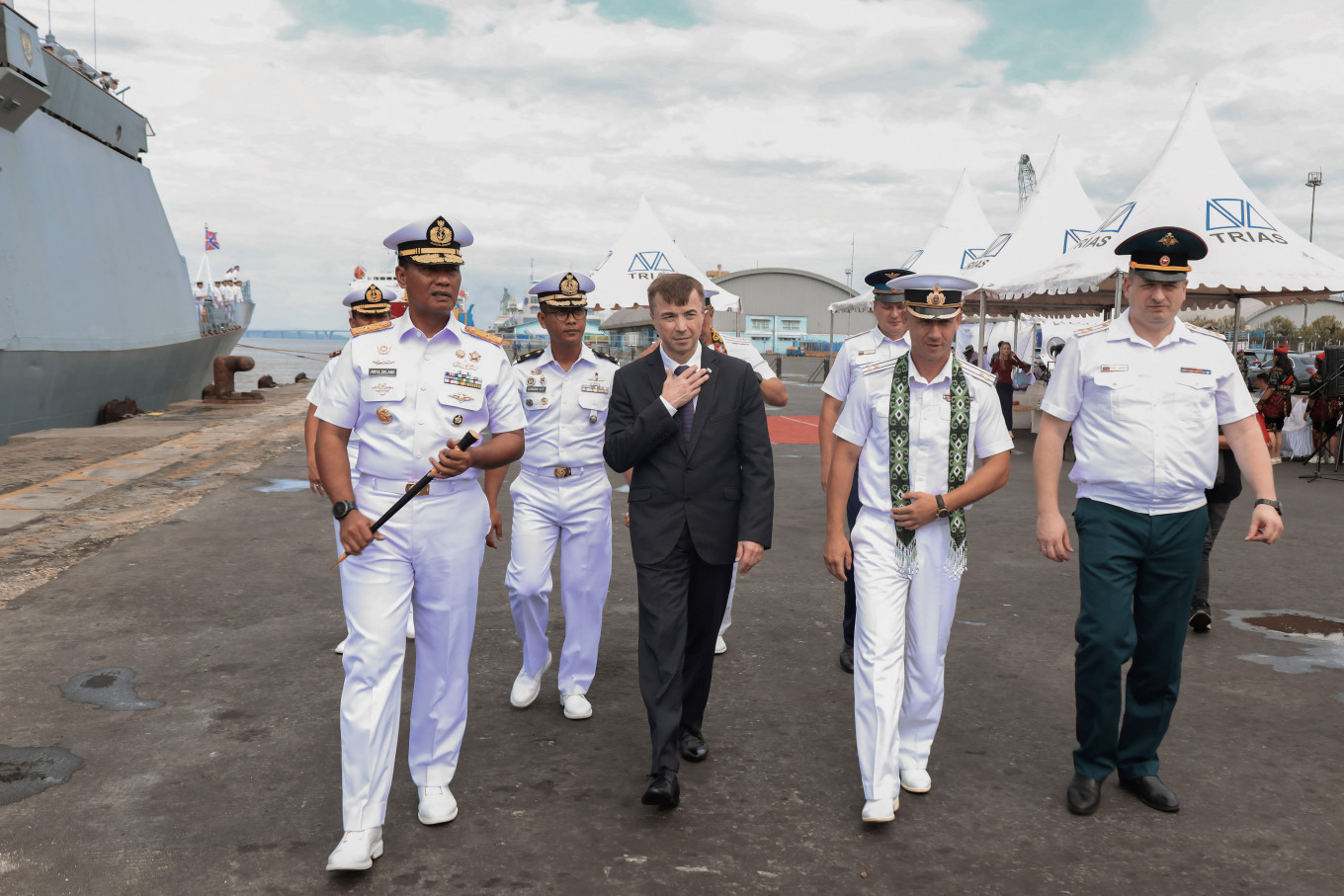Popular Reads
Top Results
Can't find what you're looking for?
View all search resultsPopular Reads
Top Results
Can't find what you're looking for?
View all search resultsLetter to the editor: Russian ambassador responds
We would like to note that Russia does not threaten anyone with nuclear weapons, and any statements to the contrary are nothing more than anti-Russian propaganda.
Change text size
Gift Premium Articles
to Anyone
 Commander of Main Navy Base 5, First Adm. Arya Delano (front row from left), Russian Ambassador to Indonesia Sergey Tolchenov, COTG Capt. Aleksei Antsiferov and Russian Military Attache to Indonesia Col. Maxim Lukianov walk together after the Russian fleet arrived at the North Jamrud pier of Tanjung Perak Port for a five-day joint military exercise between Indonesia and Russia, in Surabaya, East Java, on Nov. 3.
(AFP/Indonesian Fleet Command 2)
Commander of Main Navy Base 5, First Adm. Arya Delano (front row from left), Russian Ambassador to Indonesia Sergey Tolchenov, COTG Capt. Aleksei Antsiferov and Russian Military Attache to Indonesia Col. Maxim Lukianov walk together after the Russian fleet arrived at the North Jamrud pier of Tanjung Perak Port for a five-day joint military exercise between Indonesia and Russia, in Surabaya, East Java, on Nov. 3.
(AFP/Indonesian Fleet Command 2)
W
e noticed the article “Should Ukraine have nuclear arms?” by Slavoj Žižek published in The Jakarta Post on Nov. 26, in which the author, making reference to the new edition of the “Basic Principles of State Policy of the Russian Federation on Nuclear Deterrence,” speculates on a would-be Ukrainian “counter-doctrine” and makes accusations against Russia about alleged “imperial aggression” and “nuclear saber rattling”. It looks like the columnist did not catch the essence of the updated Russian document. This is clear from his questions “Is it fair to say that Ukraine went too far? Has it disturbed the fragile balance that kept the conflict limited?” which, by the way, have long lost relevance.
Let us go over the facts. The problem consists not in the Russian nuclear doctrine, but in the policy of the countries of the “collective West” acting like “timeservers” with narrow orientations and tactical tasks of gaining political capital in the shortest period of time, according to the principle “after us the deluge.”
Their aggressive course toward radically undermining Russia’s security and inflicting “strategic defeat” on our country continues to develop events into an escalatory spiral.
NATO countries have become increasingly involved in armed confrontation with Russia. The attacks in the Bryansk region with the American and British operational-tactical missiles, mentioned by Žižek, are confirmation of this dangerous line. In fact, it is the sign of direct military measures causing immediate damage to Russia and including participation of the Kyiv regime in the strikes using advanced missile weapons deep into our territory. Strikes that would have been impossible without the participation of NATO specialists in providing intelligence support and guiding missiles to their targets, and therefore, in their direct involvement in hostilities.
The doctrinal guidelines in the field of nuclear policy are self-sufficient and speak for themselves. As Sergey Lavrov, the Russian foreign minister, noted, we expect that those to whom the “Basic Principles” are primarily addressed will study their contents in the most attentive manner.
We would like to note that Russia does not threaten anyone with nuclear weapons, and any statements to the contrary are nothing more than anti-Russian propaganda. We always treat our nuclear deterrence policy with the utmost seriousness and responsibility. However, in view of belligerent statements and aggressive adventures of the West, we have to directly and openly warn about the consequences that further demonstrative disregard for risks may lead to. Their attempts to sow chaos and discord in Eurasia only strengthen the determination of Russia and its partners to restore order in the region. Moscow will firmly defend its core security interests by all available means, primarily by the methods of deterrence, but if necessary, then with the full power of its strategic military potential.
We hope that NATO capitals will begin to think seriously about ways to reduce the level of conflict on the basis of equality, as well as mutual recognition and respect for the interests of the parties in the field of security, as follows from the Joint Statement of the “Nuclear Five” of Jan. 3, 2022. Such an approach, currently rejected by Western countries, is the key to the effective and long-term minimization of strategic risks, including the danger of nuclear war, which, as follows from the classical postulate, should never be unleashed.
Sergey Tolchenov
Ambassador of the Russian Federation to Indonesia










